Ping Chi, Angela Hirbe, Ina Ly, Ashley Cannon, Francis Collins, Miriam Bornhorst, Verena Staedtke, Matthew Steensma and Shruti Garg
Baltimore, MD – In 2014, the Francis S. Collins Scholars Program (FCS) in Neurofibromatosis Clinical and Translational Research was launched to transform the landscape of NF1 research by attracting top clinician-scientists into the field. Named after Dr. Francis S. Collins, a towering figure in biomedical science, the program has rapidly become the most prestigious training ground for NF1 researchers worldwide. A key to its phenomenal success is the access FCS Scholars are given to exceptional mentorship, research support and an unparalleled community of scientific scholars.
Dr. Francis S. Collins, the program’s namesake, is one of the most influential biomedical research scientists in modern history. As Director of the National Human Genome Research Institute, he led the team that mapped the human genome and led a team that co-discovered the NF1 gene in 1990. He served as the longest-tenured Director of the National Institutes of Health (NIH), and is widely recognized for work that has transformed our understanding of genetics and human health. He also helped to establish the National Center for Advancing Translational Sciences (NCATS) and Brain Research through Advancing Innovative Neurotechnologies (BRAIN). By naming the program in his honor, NTAP sought to inspire the next generation of NF1 researchers to embody Collins’ spirit of discovery and dedication to translational science with real potential to positively impact people’s lives.

NTAP’s investment of over $11.5 million over the last decade into the FCS Program has yielded striking results. In just 10 years the FCS Program has trained 18 scholars representing 17 institutions across five countries. FCS Scholars have gone on to lead pivotal NF1 studies, collectively securing over $85 million in follow-on funding for NF1 research across the globe from over 11 different funding sources, and publishing more than 60 peer-reviewed articles. Their research has changed what is possible in early detection of the rare cancers that are the biggest threat to people with NF1, understanding the mechanisms underlying neurofibroma formation to enable both treatment and prevention of these tumors, how the powerful oncogene RAS can be managed and how NF1 influences brain development and function. By advancing our understanding of all aspects of NF1 science, the Francis Collins Scholars are paving the way for new treatments and accelerating progress to a cure.
What truly sets the Francis S. Collins Scholars Program apart is its emphasis on mentorship and community. Scholars are not only given resources to conduct research but are also surrounded by a network of mentors and peers who guide and collaborate with them. Sally Gottesman, External Advisory Committee member, and mom to a child with NF1, underscores the urgency behind the program, “For families like mine, waiting decades for answers is not an option,” she says. “The Francis S. Collins Scholars Program channels focused research and talent into accelerating the development of therapies. It’s about getting to treatments now, not in some distant future.” This focus on accelerated results has empowered scholars to lead high-impact studies and has cultivated a new generation of NF1 experts who are committed to translating their research into real-world therapies.
Executive Director of NTAP, Dr. Jaishri Blakeley highlights the program’s pivotal role in NTAP’s mission to find treatments and cures for the tumors that impact people with NF1. “The Program is an anchor in NTAP’s strategy,” she explains. “By investing in the next generation of NF1 researchers, we are building a community of scientific leaders as well as a collaborative network that works transparently to solve previously unsolvable challenges. The FCS researchers share insights and accelerate progress collectively, with the ultimate goal of delivering new diagnostic tools and therapies to patients as quickly as possible.”
As the Program enters its second decade, it continues to embody the spirit of its namesake’s pioneering career. Just as Dr. Collins’ groundbreaking work in human genetics and medicine reshaped our understanding of human health and disease, the FCS Program is redefining what’s possible for NF1. By fostering collaboration, empowering innovative thinking, and guiding scholars to translate their discoveries into real-world therapies, the program harnesses Dr. Collins’ legacy of scientific excellence in service of improving people’s lives. For early-career clinician-scientists who aspire to follow in his footsteps and audaciously push the boundaries of what can be achieved in rare disease research, the FCS Program is more than an opportunity—it’s a call to action to make a difference now.
What you need to know to apply
The Francis S. Collins Scholars Program is open to candidates who hold a health-professional degree permitting patient care and are in the final stages of post-doctoral training or within the first seven years of a faculty appointment. The program offers up to 100% salary support for 2-3 years, funding for research costs, tuition for relevant coursework, travel to scientific meetings, and mentor stipends.
